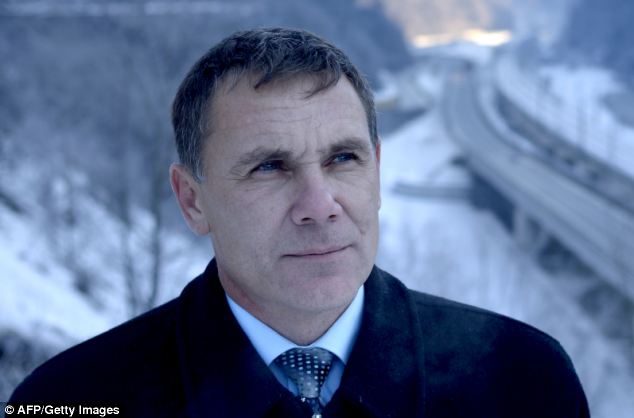
Jailed Environmentalist ‘Real Hero of Russia,’ Mitrokhin Says
Publication: Eurasia Daily Monitor Volume: 11 Issue: 123
By:

Last week, Yevgeny Vitishko marked his 40th birthday in a Russian prison where he is serving a three-year sentence, because he exposed the environmental damage Vladimir Putin and his entourage inflicted on the North Caucasus in the run-up to the Sochi Olympics. He has always had the support of Russian environmental activists and international ecological organizations. But this year for his birthday, he acquired something more: a declaration by liberal Russian politician and commentator Sergey Mitrokhin that Vitishko—and not the people trumped up by Moscow television—is “a real hero of Russia,” an epithet which not only may help to free the imprisoned activist, but may also help to combine the environmental and liberal communities in Russia and empower both (Kasparov.ru, July 4).
Vitishko, an activist with the organization Ecological Watch on the North Caucasus, first landed in trouble with the Russian authorities in November 2011, when he and a group of colleagues were gathering information about the illegal use of land by the Krasnodar governor. They were accused of “failing to obey a police order” and given ten-day sentences. A month later, Vitishko and another activist were given three-year suspended sentences for supposedly damaging government and private property. As a condition of his release, he was told he could not leave the Tuaps district. And when he did, a local court reinstated his prison term. Symbolically, his appeal was rejected on February 12, during the Sochi Olympiad, a perfect illustration of why he was really punished and qualifying him as “an Olympic prisoner,” Mitrokhin says.
The imprisoned activist could have avoided all these travails and the additional ones in the camp, where commanders set other prisoners on him—having spread the story that Vitishko’s contacts with the media were the reason none of them could make calls—had he chosen to emigrate, something the Russian authorities were quite prepared to let him do. But Vitishko refused to do so, saying that it would be “inconsistent” with his stand, with his defense of the environment and the rights of prisoners in Russia, and with his plans to run for mayor of Sochi upon his release.
That Vitishko has the political skills to run in an election is suggested by the fact that he has won such “enormous moral authority” among the prisoners, that many of them now call him “the deputy,” because of the legal help he has provided them and the attention his case has attracted among people like Mitrokhin.
Mitrokhin’s new article follows a declaration by Yevgeniya Chirikova, leader of the movement Ecological Defense of Moscow City and Oblast, that Moscow’s repressive actions and Vitishko, in particular, have created the need for a new term analogous to “prisoner of conscience”—“prisoner of the environment.” That is especially true for Russia. There, she said, the authorities have killed some, like Mikhail Beketov; they have driven others, like Suren Gazaryan, to flee the county—he is now in Estonia—and they have imprisoned others, like Vitishko (Bellona.ru, May 30).
Efforts to ensure Vitishko’s security are ongoing, both within Russia and around the world, Chirikova said. And “today there is an agreement with one company that if we gather 100,000 signatures, then it will pay for an appeal to the European Court [for Human Rights],” she added. This possibility must be used. She noted that ever more environmental protection and human rights groups in other countries are also organizing and demonstrating on behalf of Vitishko, who has become the symbol for many of popular resistance to the environmental destruction being inflicted by the Russian government and Russian corporations. The petition can be found at Bellona.ru, signatures and the efforts of environmentalists to free Vitishko are described at https://freevitishko.org.
The Eco-Hostage Organization declared that Vitishko and Gazaryan were victims of persecution for the defense of nature. The Union of Solidarity with Political Prisoners said the charges against them were politically motivated. And Russia’s Memorial included Vitishko in its list of political prisoners. Despite the official persecution, Vitishko continued to work to expose the destruction of the environment by those organizing the Sochi Olympics. As a result, on December 20, 2013, the courts changed his sentence and ordered him imprisoned. According to Freevistisko.org, “the initiators [of that change] were the local siloviki.”
In support of Vitishko and to advance environmental protection, Russian activists have met with journalists to try to attract more coverage of Vitishko and their issues. They have also launched an online journal, “Ecology and Law,” to spread the word (Bellona.ru, May 31). The latest issue of Ecology and Law is devoted to the use of social media and Internet technologies by environmental activists. In addition to articles and interviews about such problems, it features a poster Russians can use to call even more attention to Vitishko.




